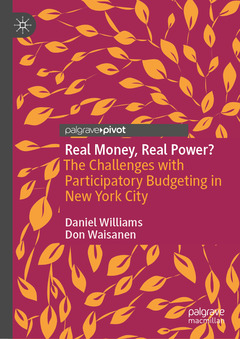Real Money, Real Power? , 1st ed. 2020 The Challenges with Participatory Budgeting in New York City
Auteurs : Williams Daniel, Waisanen Don

Chapter 1: Introduction: Real Money, Real Power?.- Chapter 2: Participatory Budgeting from the Past to the Present.- Chapter 3: The Challenges of Neighborhood Assemblies.- Chapter 4: The Challenges of Delegate Meetings.- Chapter 5: The Challenges of Project Expos and Pop-Up Voting.- Chapter 6: Conclusion: Doing Participatory Budgeting Right.
Daniel Williams has been with Baruch College since 1995 where he teaches budgeting, performance measurement, and ethics. Prior, he was the budget director for the Virginia Department of Medical Assistance Services (Medicaid). Williams has previous studies of New York City Participatory Budgeting with Thad Calabrese and Anubhav Gupta in Administration and Society and of a New York City discretionary spending with Yonghong Wu in the Journal of Public Budgeting, Accounting, and Financial Management.
Don Waisanen is a Professor in the Baruch College, CUNY Marxe School of Public and International Affairs, where he teaches courses and workshops in public communication—including executive speech training, communication strategy, and seminars on leadership, storytelling, and conflict management. All his research projects seek to understand how communication works to promote or hinder the force of citizens’ voices.
Offers an investigative, behind-the-scenes look at New York City's participatory budgeting (PB) process, which takes readers through an entire annual cycle
Provides a clear account of issues related primarily to transparency, manipulation, and favoritism that are not commonly acknowledged in the PB literature
Provides a critical review of the experience of the asserted beneficiaries of participatory budgeting and reveals a variety of barriers to actually achieving those benefits
Recommends substantial reform, specifically as it pertains to a lack of transparency, manipulation by city agencies, favorable treatment of insider proposed projects, and a failure to reveal the basis of project costs
Date de parution : 10-2020
Ouvrage de 112 p.
14.8x21 cm
Disponible chez l'éditeur (délai d'approvisionnement : 15 jours).
Prix indicatif 58,01 €
Ajouter au panier


